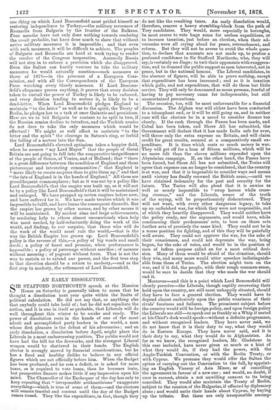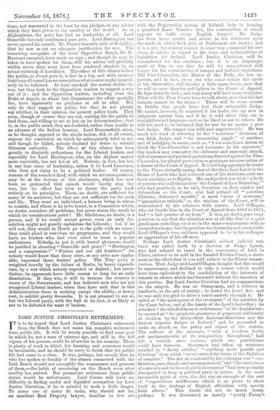AN EARLY DISSOLUTION.
SIR STAFFORD NORTHCOTE'S speech at the Mansion House on Saturday is generally taken to mean that he thought a dissolution next year quite within the limits of political calculation. He did not say that, or anything else that anybody could take hold of ; but he did not repudiate the notion, and it is one in itself so probable, that Liberals will do well throughout this winter to be awake and ready. The power of dissolution rests in the hands of one of the most adroit and accomplished party leaders in the world, a man whose first pleasure is the defeat of his adversaries ; and an early dissolution, a dissolution before April, might place the Liberals in a most embarrassing position. The public would not have had the bill for the fireworks, and the strongest Liberal weapon would be shattered in their hands. The English elector is strongly moved by financial considerations, but he has a fixed and healthy dislike to believe in any official figures which are not officially before him. When the Budget has been produced, and he sees a deficit, or is asked for more taxes, or is required to vote loans, then he becomes irate, but prospective finance makes little if any impression upon his mind. The Chancellor of the Exchequer of the day has only to keep repeating that " irresponsible arithmeticians" exaggerate everything—which is true of some of them—and the electors will remain trustful and content until the day of the Budget comes round. They like the expenditure, in fact, though they do not like the resulting taxes. An early dissolution would, therefore, remove a heavy stumbling-block from the path of Tory candidates. They would, more especially in boroughs, be most averse to vote huge sums for useless expeditions, or to increase taxation, just before an election, when their ad- versaries were all crying aloud for peace, retrenchment, and reform. But they will not be averse to avoid the whole ques- tion, to declare that accounts are not made up, to profess a profound confidence in Sir Stafford Northcote, who, they will say, is certainly no Jingo ; to twit their opponents with exaggera- tion, and to demand the public support as men interested, not in pence, but in the national honour. The Liberal candidates, in the absence of figures, will be able to prove nothing, except that expenditure has been increased ; and as it is taxation which galls, and not expenditure, that will do them but little service. They will only be denounced as mean persons, fearful of having to pay necessary sums for indispensable, but still unascertained precautions.
The occasion, too, will be most unfavourable for a financial discussion. The Afghan war will either have been conducted to a triumphant end, or it will be still going on, and in neither case will the electors be in a mood to consider finance too closely. If the rush through the Passes has been made, and Cabul has been taken, and Shere Ali has submitted, the Government will declare that it has made India safe for ever, will throw only the extra expense on Britain, and will claim credit for great results, secured at a comparatively small ex- penditure. It is time which costs so much money in war. They will get off for a loan of fifteen millions, which will be no more felt than the eleven millions expended upon the Abyssinian campaign. If, on the other hand, the Passes have been forced, but Shere Ali has not submitted, the Tories will agree that expense can no longer be considered, that the country is at war, and that it is impossible to consider ways and means until victory has finally crowned the British arms,—until we have obtained indemnity for the past and security for the future. The Tories will also plead that it is unwise as well as nearly impossible to " swap horses while cross- ing streams," and the Liberals, aware of the truth of the saying, will be proportionately disheartened. They will not want, with every other dangerous legacy, to take up an unfinished war, for which they were not responsible, and of which they heartily disapproved. They would neither have the policy ready, nor the arguments, and would have, while condemning their predecessors' acts, to base on those acts further acts of precisely the same kind. They could not be in a worse position for fighting, and of this they will be painfully well aware. They could not approve the war, for the sake of their consciences, and could not deprecate the war, being begun, for the sake of votes, and would be in the position of men of infirm purpose called on for a most critical deci- sion. Many of them would be afraid of the situation, should they win, and many more would utter speeches indistinguish- able from those of Tories. The election might turn on the war, and if it did, the people, with their rough common-sense, would be sure to decide that they who made the war should end it.
Moreover—and this is a point which Lord Beaconsfield will clearly perceive—the Liberals, though rapidly recovering their hold upon the country, are still most unhappily situated, should they have to face a general election. They would have to depend almost exclusively upon the public weariness of their rivals' fussiness and failures. The prominent subject before the country would still be foreign policy, and upon foreign policy the Liberals are still—to speak out as frankly as a Whip if seated at his Chief's desk would speak—without a definite programme, and without recognised leaders. They have never said, we do not know that it is their duty to say, what they would do in Eastern Europe. They have never said, and it is their duty to say, what they would do in Afghanistan. As far as we know, the recognised leaders, Mr. Gladstone in this case included, have never given so much as a hint of what they would do, if they had the power, with the Anglo-Turkish Convention, or with the Berlin Treaty, or with Cyprus. We presume they would offer the Sultan the option of carrying out the Convention to the full, by appoint- ing an English Viceroy of Asia Minor, or of cancelling the agreement in favour of a new one ; and would, no doubt, if once in earnest, obtain a not unwilling consent to its being cancelled. They would also maintain the Treaty of Berlin, subject to the reunion of the Bulgarias, if effected by diplomacy alone ; and would untie their hands about Cyprus, by buying up the tribute. But these are only irresponsible assump- tions, not warranted in the least by any pledges, or any advice which they have given to the country or the world. As to Afghanistan, the party has had no leadership at all. Lord Granville has only condemned past acts. Lord Hartington has never opened his mouth. Mr. Forster has only said, at Keighley, that he saw as yet no adequate justification for war. The remaining occupants of the front Opposition Bench, Sir W. Harcourt excepted, have made no sign ; and though he may be taken to have spoken for them, still his advice will probably within seven days more have been rendered obsolete by an actual outbreak of hostilities. The effect of this silence is that the public, as Punch puts it, is lost in a fog, and with amateur link-boys all round has no conception what course ought immedi- ately to be followed. At least one-half the nation dislike the war, but they look to the Opposition leaders to suggest a way out of it ; and the Opposition leaders, including even the Duke of Argyle, in whose late Department the affair specially lies, have apparently no guidance at all to offer. Not only do they suggest no policy, but they do not plainly say whither, in their opinion, the present policy leads. They seem, though of course they are not, waiting for the public to lead them, and willing to act at last on its determination ; that is, in the public mind, they are doubtful, rather than hostile to an advance of the Indian frontier. Lord Beaconsfield, when, as he thought, opposed to the whole nation, did, at all events, express the conviction on which he subsequently tried to act, and though he failed, nobody doubted his desire to rebuild
Ottoman authority. The effect of this silence has been greatly to diminish enthusiasm for the Liberal leaders, and especially for Lord Hartington, who, on the Afghan matter more especially, has not led at all. Nobody, in fact, has led, in any true sense of leadership, unless it be Lord Lawrence, who does not claim to be a political leader. Of course, reasons of the soundest kind, with which we are unacquainted, may be at the bottom of this abstinence, which has now been so protracted that speech would hardly stop the war, but its effect has been to throw the party back entirely on its principles. These, no doubt, are sufficient for many of its members, but they are not sufficient for the rank and file. They want an individual, a human being in whom to confide, and where is he to be found, in a Committee which, no doubt, considers all problems, but never states the result to which its considerations point ? Mr. Gladstone, no doubt, is a person, and if he would accept power, even an early dis- solution might not greatly embarrass the Liberals ; but if he will not, they would in March go to the polls with no cause ; they could plead in war-time no programme, and they would have no leaders who had even cared to rouse a popular enthusiasm. Nobody, to put it with brutal plainness, would be justified in shouting " Granville and peace !" " Hartington and a compromise !" " Forster and our old frontiers !" for nobody would know that those cries, or any cries now applic- able, expressed those leaders' policy. The Tory party is weighted heavily by the failure at Berlin, by heavy expendi- ture, by a war which nobody expected or desired ; but never- theless, its opponents have little reason to long for an early dissolution. If they win, it will be because the country is weary of the Government, and has believed men who are not recognised Liberal leaders, when they have said that in this Administration there is nothing except the ability, at heavy cost, to exhibit pretty fireworks. It is not pleasant to say so, but the Liberal party, with the ball at its foot, is as likely as not to be defeated for want of leaders.



































 Previous page
Previous page